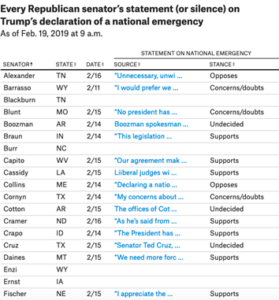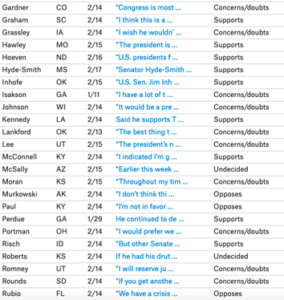As the legal and public opinion fallout swells from President Trump’s “national emergency” declaration, FiveThirtyEight’s Perry Bacon and Nate Silver provide a helpful cheat-sheet on where Republican senators purport to stand on the issue. But, as the duo explain, “opposing the declaration and voting for a resolution to end it are not the same thing.” In the aftermath of the declaration and with growing public opposition to the policy, Republican members of Congress must be clear if they stand with Trump or the American people.
Read the entire piece online here, excerpted below:
Republicans have a 53-47 advantage in the Senate, so only four defections and this resolution would pass. (The resolution is not subject to rules that would require 60 votes for it to move forward.) By FiveThirtyEight’s count, at least eight GOP senators — Tennessee’s Lamar Alexander, Maine’s Susan Collins, Alaska’s Lisa Murkowski, Kentucky’s Rand Paul, Florida’s Marco Rubio, Nebraska’s Ben Sasse, North Carolina’s Thom Tillis and Pennsylvania’s Pat Toomey — have said they oppose the national emergency declaration. Opposing the declaration and voting for a resolution to end it are not the same thing, but more than a dozen other Republican senators have also expressed reservations about Trump’s move.
….Yes, we know that in the past GOP senators have hinted that they will break with Trump on key legislation and then not followed through. That said, we are talking about only four senators needing to break with the president on this resolution. And three of the Republicans to come out against the declaration — Collins, Murkowski and Paul — were key figures in stopping the GOP from repealing Obamacare in 2017, so they have in at least one major instance actually followed through on their concerns with a Trump initiative.
In other words, there’s a real chance that both houses of Congress pass this legislation. A bill adopted by the GOP-controlled Senate rejecting Trump’s emergency declaration would be important symbolically. And it would force Trump to issue the first veto of his presidency, which will bring even more attention to his already unpopular move to declare a national emergency.
What happens if Trump vetoes the resolution?
In the Senate, 67 votes would be needed to override his veto, meaning 20 Republicans would need to break with the president. As noted above, there are more than 20 Senate Republicans wary of this move. So it’s at least theoretically possible that the dam could break; the fissures run deeper than the typical issues on which only a handful of Republicans like Collins and Murkowski are considering a vote against the president. But not liking the emergency declaration and voting for a resolution that will stop it — and stoking Trump’s anger as many Republicans are gearing up for primaries in 2020 — are totally different things. It’s also not clear if McConnell is required to even hold a vote on the veto override.




